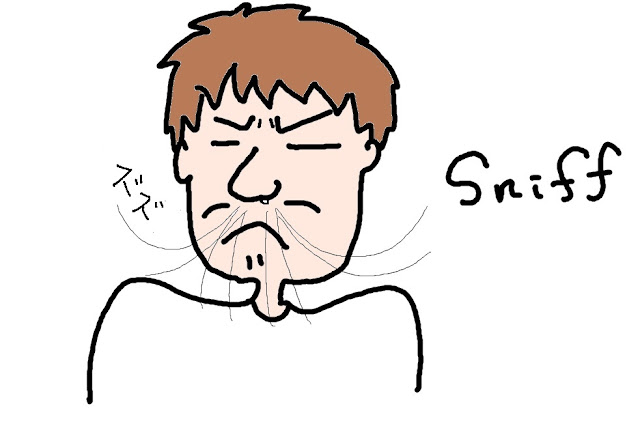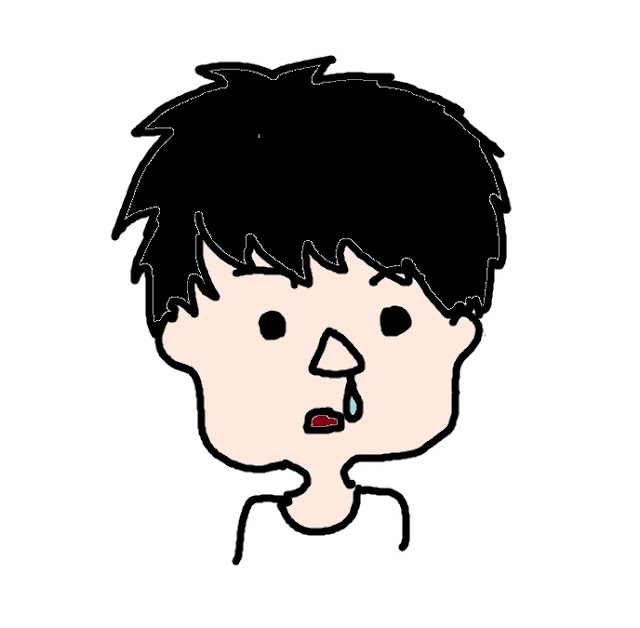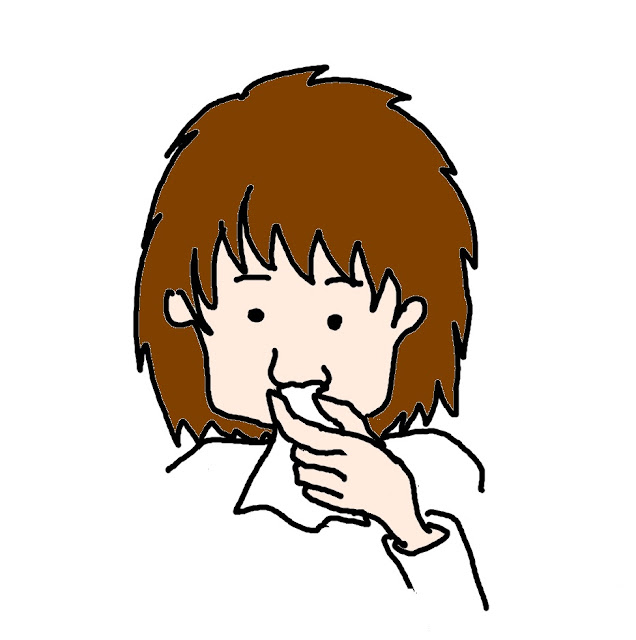Useful expressions when your nose is running.
Everyone can have a runny nose. You might have it when you are in Japan. I don't think you will use these expressions all the time, but that' why when you want to or need to use them, you might not know or remember how to say. I list up useful expressions you can use when you have a runny nose here.
Firstly. In Japanese, we call the liquid coming out from your nose (snivel), 鼻水 (Hana-mizu), literally nose water.
鼻水が出る/出ます。 Hana-mizu ga deru/demas.
If you have a runny nose, you say, 鼻水が出る. If you are seeing a doctor because you have a runny nose, you would say, 鼻水が出ます。
鼻をすする Hana o susuru. (To sniff one’s nose)
Now, you might want to take your handkerchief or tissues to blow your nose, however, Japanese people normally don’t blow their nose in the public space. Instead, they often sniff. I know you wouldn’t do it in Canada but we do in Japan! If you are on the train in Japan, you might hear the sound very often especially in winter. You explain this situation 皆、鼻をぐすぐすとすすっている。(Mina, hana o gusugusu to susutte iru.) (Everyone is sniffing.)
*ぐすぐす…one of the onomatopoeic words (Gion go) to express sniffing sound.
鼻水が垂れる Hana-mizu ga tareru.
You have a watery nose, and the snivel started to come out from your nose. You say, 鼻水が垂れてきた!(Hana mizu ga tarete kita!). If you see the water is coming from someone else's nose, you say 鼻(水)垂れてるよ!(Hana mizu ga tareteru yo!)
You can also say 鼻水が出てきた。(Hana-mizu ga detekita.). In this case, people might not see your snivel. I mean, you can use when you feel the snivel is getting full inside of your nose, as well as when it is really started to come out from your nose. When some one say 鼻水が出てるよ。 (Hana-mizu ga deteruyo.) to you, it is the same meaning of 鼻(水)が垂れてるよ!
鼻水が出てるよ。 sounds a little bit formal.
鼻水を拭く Hana mizu o huku. (To wipe one's nose)
Now, you might want to wipe the snivel. Not blow your nose yet. You wipe it.
鼻をかむ Hana o kamu. (to blow one’s nose)
Finally, you cannot sniff anymore and decided to blow your nose. You might want to go to the washroom to do it. We call this action 鼻をかむ.
Examples
鼻、かんでくる。Hana, Kande kuru.
(I’ll go to blow my nose.)
鼻、かんでもいい? Hana, Kandemo ii?
(Do you mind if I blow my nose?)
―いいですよ。ii desu yo.
(No. go ahead.)
鼻水が止まらない (Hana mizu ga tomaranai) My nose won’t stop running!
You tried to manage your runny nose by sniffing, wiping or blowing your nose but the water still comes out. You would say 鼻水が止まらない。 鼻水が止まりません。(Hana mizu ga tomarimasen.).
When it stops, you say, 鼻水が止まった。
Example
薬を飲んだら鼻水が止まった。
(Kusuri o nondara hanamizu ga tomatta.)
(My nose stopped running after taking medicine.)
鼻が詰まる。Hana ga tsumaru. (My nose is stuffed.)
You’ve got stuffed nose. You say, 鼻が詰まっている。(Hana ga tsumatteiru.). These words can be a noun 鼻づまり (Hana zumari).
鼻が苦しい。Hana ga Kurushii.
Now you have trouble breathing because your nose is stuffed. You say, 鼻が苦しい。(Hana ga kurushii.) People just omit some words from the sentence. The full sentence is 鼻が[詰まって息が]苦しい。(Hana ga [tsumatte ikiga] kurushii.), means "My nose is stuffed and I have trouble breathing".
鼻が利かない。Hana ga kikanai. (I can't smell anything.)
Your nose is stuffed and you cannot smell anything. You say, 鼻が利かない。You would also say 何も匂わない。(I cannot smell anything.) This expression is also used when you had a strong smell before and cannot smell slight smell after.
鼻声 Hana goe (Nasal voice)
You have a stuffed nose and your voice doesn’t sound same as usual. You probably have Hana goe.
くしゃみ Kusyami (Sneeze)
In Japan, people don't say "Bless you." after someone sneezes, and you don't need to say "Excuse me." or "smimasen." in public space. However, if you sneezed when you are talking to someone important, you say "Shitsurei shimashita." after you sneezed. Please cover your mouth anytime when you sneeze.
くしゃみがたくさん出る。
(Kusyami ga takusan deru.) (I sneeze a lot.)
くしゃみが止まらない。
(Kusyami ga tomaranai.) (I can't stop sneezing.)
くしゃみが出そう。
(Kusyami ga desou.) (I'm gonna sneeze.)
Gitaigo (Onomatopoeic sounds for snezzing.)
*Depending on the person, the words can be slightly different.
はっくしょん (big sneeze.)
くしゅん (small sneeze.)
花粉症 kafun sho (hay fever)
If you are sneezing a lot, with having a runny nose and watery eyes, you might have a hay fever. It is called Kafun sho in Japanese. You might want to wear a surgical mask and glasses.
鼻炎薬 Bien yaku (Medicine for runny nose)
鼻炎薬 is a type of medicine for runny nose. If you look for a medicine at a drug store, you ask 鼻炎の薬はありますか。(Bien no kusuri wa arimasuka.) There are two types of 鼻炎薬, one is for sickness, one is for allergic rhinitis including hay fever. If you have sore throat, fever or cough as well as runny nose, look for 風邪薬 (kaze gusuri) (Cold medicine).
Examples
I made a script using some of the expressions I introduced above.
居酒屋で。(At Japanese izakaya restaurant)
A:さっきから鼻すすっているけど、大丈夫?
You have been sniffing your nose. Are you ok?
B:うーん、鼻水が止まらなくて、垂れてくるから拭きたいけど、ティッシュ持ってくるの忘れちゃって。
Well…, my nose just keep running so I want to wipe it but I forgot to bring tissues.
A:私、ティッシュ持ってるよ。使って使って。
I have tissues. Please use them.
B:ありがとう。
Thank you.
A:拭いても止まらないでしょ。かんだら?
Just wiping it doesn’t help. Why don’t you blow your nose?
B:ここでかんでもいい?
Do you mind if I do it here?
A:いいよ。
No, I don’t.
料理が運ばれてくる。(The waitress brought your dishes.)
A:あー、おいしそうなにおいがする!
This dish smells good!!
B:そうなの!?鼻が詰まってるから、何も匂わないや。
Is that right? My nose is stuffed and I cannot smell anything.
Conclusion
I remember when I was a kid (around 12 years old), I always had a watery nose in winter and I had a face towel with me all the time to wipe my nose in the classroom. I never blown. I was a girl. I didn't want other people to see me blowing my nose. I think people still think blowing your nose in public is something dirty, but if you really need to do it, do it quietly (which might not really help).
Anyway, I hope you have a healthy life in Japan but when you have a runny nose, I hope this article will help you.








No comments :
Post a Comment